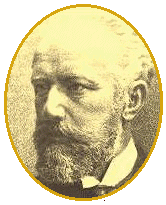

|


|
| PETER ILYICH TCHAIKOVSKY Born: May 7, 1840. Kamsko-Votkinsk, Russia Died: November 6, 1893. St. Petersburg, Russia In his own words... "How can one express the indefinable sensations that one experiences while writing an instrumental composition that has no definite subject? It is a purely lyrical process. It is a musical confession of the soul, which unburdens itself through sounds just as a lyric poet expresses himself through poetry... As the poet Heine said, 'Where words leave off, music begins.' "Russian composer. Tchaikovsky is best known for his ballets and symphonies. In many ways, Tchaikovsky's life and career placed him uncomfortably between different worlds, and this conflict was a central aspect of his creative life. Perhaps this can be seen most clearly in his position as a Russian composer. Russia had a long history of cultural contact with the West. The very European city of St. Petersburg is the greatest example of this dynamic. Tchaikovsky's musical training at the newly founded St. Petersburg conservatory was likewise influenced by European ideals. His success in his studies there landed him a job as a teacher in the new Moscow conservatory. As a member of the musical elite of Russia, he found that his music pleased few. It was too advanced and modern for his Western-trained peers, and at the same time too Western in its outlook to please the growing and influential champions of a Russian national style. He did begin to find favor with the Russian public, especially with his first symphonies. At the same time, his homosexuality also placed him in an untenable position. Unable to come to terms with it, he married an admirer, hoping to resolve his problems in domestic life. This proved a bitter failure, and in desperation he fled both the marriage and his post at the conservatory. He was fortunate to have at this time the support of the eccentric Nadezhda von Meck, allowing him to recover emotionally and continue his career, touring Europe and America. This period of despair is framed by two periods of great creativity. Before the crisis, he had written many of his most famous works, including his first three symphonies, the ballet Swan Lake, and his Romeo and Juliet overture. During the time of his greatest difficulty, he completed his monumental Fourth Symphony and the opera Eugene Onegin. But the next years brought little. In 1884, spurred by the composer Balakirev, Tchaikovsky entered a final productive period, completing his last three symphonies and the ballets The Sleeping Beauty and The Nutcracker. His final work, the Sixth Symphony, deals powerfully with nothing less than the ideas of life, struggle and death. Nine days after its premiere, Tchaikovsky died. The circumstances of his death are still a matter of conjecture. Musical Examples: Works:
|
| Mozart | Beethoven | Chopin | Tchaikovsky |
|---|